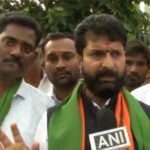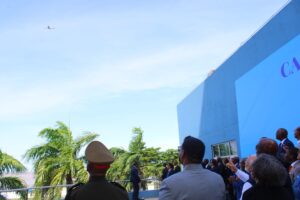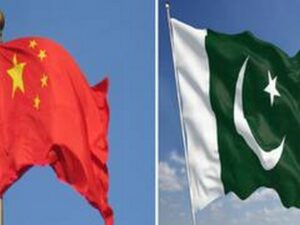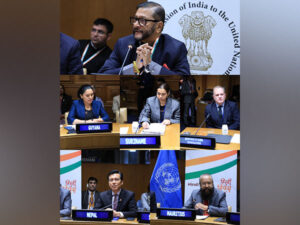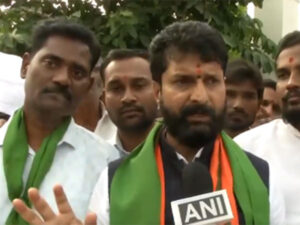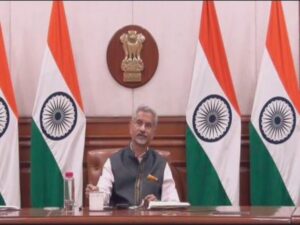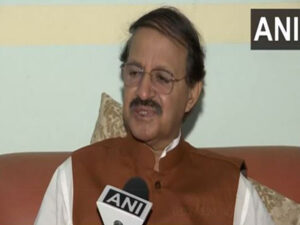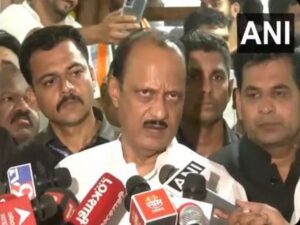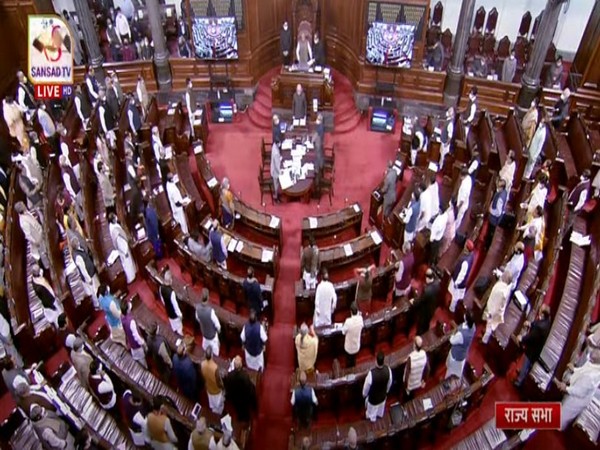
New Delhi [India], December 19 (ANI): Amid continuous ruckus by the opposition, the productivity of Rajya Sabha hit a low of 37.60 percent during the third week of the ongoing winter session pulling down the functionality of the House for the first three weeks to 46.70.
According to Rajya Sabha Secretariat, the productivity of Rajya Sabha was 49.70 percent and 52.50 percent for the first and second weeks respectively. During the third week, the House could function for only 10 hours 14 minutes of the total scheduled sitting time of 27 hours 11 minutes, losing 62.40 percent of available time on account of disruptions and forced adjournments on the issue of suspension of 12 members of the House.
During the third week, Question Hour which is meant for seeking the accountability of the Government has suffered the most with only four of the 75 listed Starred Questions orally answered by the concerned ministers, said the RS Secretariat
Only 11.40 percent of the time available for Question Hour was utilized during the week. On the other hand, 62.70 percent of the functional time has been spent on the government’s legislative business. Three Bills were passed and returned during the week after discussing for a total time of 6 hours and 25 minutes in which 33 members participated.
A short duration discussion on ‘Situation arising out of the cases of Omicron variant of COVID-19’ taken up during the week remained inconclusive. This discussion is listed for resumption on Monday. RS Chairman M Venkaiah Naidu adjourned the House on Friday last after 17 minutes of Zero Hour urging the government and the opposition parties to resolve the stalemate on the suspension issue.
During the 15 sittings of the first three weeks of the ongoing monsoon session, the House functioned for less than an hour per day for six sittings. The productivity of the House has been 75 percent or more on six days. About 42 percent of the functional time of the House has been spent on the Government’s legislative business passing a total of eight Bills so far. Only about 18 percent of the time has been spent on the Question Hour with only 56 of the 217 listed questions orally answered, said the RS Secretariat statement.
So far, 81 Zero Hour and 47 Special Mentions were made in the House during the three weeks of the winter session. The Mediation Bill, 2021 seeking to promote resolution of disputes including commercial is listed for the introduction on Monday in the Rajya Sabha. The Narcotics Drugs and Psychotropic Substances (Amendment) Bill, 2021 as passed by Lok Sabha has been listed for consideration and passing on Monday. The winter session of the Parliament is likely to conclude on December 23. (ANI)
Disruptions in Parliament ‘aberrations’ in democracy, says Deputy Chairman Rajya Sabha
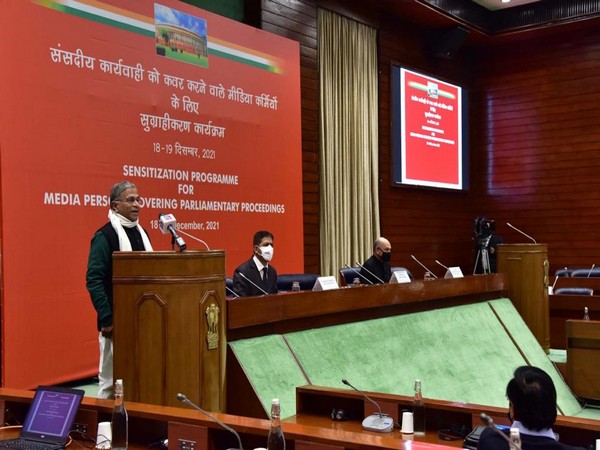
New Delhi [India], December 18 (ANI): Disruptions in the Parliament Houses are aberrations in democracy and freedom of media is indispensable for the successful functioning of democracy, said Rajya Sabha Deputy Chairman Harivansh Narayan Singh on Saturday here in Parliament premises.
The Deputy Chairman said that media is a vital interface between the Parliament and the people of the country while inaugurating a two-day sensitization program for media persons covering parliamentary proceedings. Addressing the program that was attended by over 40 journalists from various print and electronic media organizations, Harivansh stated that the media is the fourth pillar of democracy which has an important role in strengthening the democratic institutions and processes.
He described media as a vital interface between the Parliament and the People of the country and stated that both the Parliament and the media complement each other and both cannot function effectively without each other in a democracy. While recognizing the importance of the information technology revolution, Harivansh stated that print, electronic, digital, and social media and FM Radio have a wider reach and helped in bringing political debates closer to the people that augur well for promoting participatory democracy.
Quoting the former Chairman of Rajya Sabha, Late Krishan Kant’s views on the Parliament and media, Harivansh stated that the functions of media are to entertain, inform and educate.
The Deputy Speaker stated that former Chairman of Rajya Sabha Late Krishan Kant described the relationship between Parliament and the media in the context of Mahabharata and Gita where Parliament was called Dharmakshetra. He considered Sanjay and Babhruvahan, the famous characters of the ‘Mahabharat’ together as performing the role of media.
Harivansh termed disruptions in the House as aberrations in democracy affecting the credibility and dignity of legislative institutions. He said that media has every right to highlight these challenges of democratic institutions, and added that serious and constructive discussions of members should also get space in media.
Harivansh said that it is very important to highlight the issues of public importance raised in the House, important recommendations made by Parliamentary Committees, and constructive work done by Members of Parliament to sustain public trust and confidence.
He stated that Rajya Sabha Chairman M Venkaiah Naidu emphasized the need for effective use of precious Parliamentary time to increase the productivity of the House and to restore public trust in Parliamentary institutions. Harivansh asserted that freedom is never absolute and freedom of speech and expression is subject to reasonable restrictions.
He said that protection has been provided to the press and media under article 361A of the Constitution of India and the Parliamentary Proceedings (Protection of Publication Act, 1977) to publish substantially two reports of the proceedings of Parliament unless the publication is proved to have been made with malice. “Despite these constitutional and legal provisions, the Parliament and the Press sometimes come into conflict with each other in an attempt to defend their independence.” He later stressed the need to strike the right balance between these two institutions.
The Deputy Chairman mentioned that while reporting the proceedings of the House, it is necessary to understand the procedural dynamics along with the procedure, precedents, and practices and stressed the need for objective and unbiased reporting on what takes place on the floor of the House with utmost care and restraint in a correct perspective.
Harivansh also emphasized the need for proper coverage of the Committee Reports and added that Parliamentary Committees function in a nonpartisan manner and examine schemes and budgets of the Government. “But the Committee reports get less media coverage,” he said. Speaking on the reporting of budgets, Harivansh said that media makes extensive coverage of budget, however, there is relatively less reporting on its expenditure part.
Therefore, the Deputy Chairman urged the media to make comprehensive coverage of the budget expenditure.
Harivansh further noted that the media should focus not only on the outcome of the Bills but also on debates where members express diverse views. He further stated that answers to the questions asked by Members in the Parliament contain valuable information in not only making citizens more aware of the policies of the Government but can also empower journalists for their work. On this occasion, P. C. Mody, Secretary-General, Rajya Sabh





